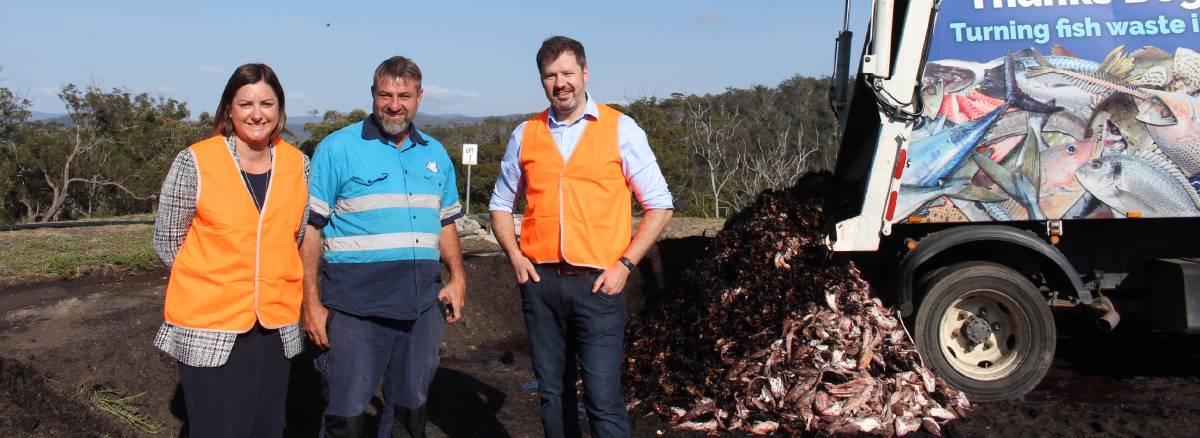Bega District News, MARCH 17 2021 – 2:00PM
It’s a business that is sitting on the cusp of breaking through into the big time. It also ticks many environmental boxes, is part of the circular economy, and has been developed here in the Bega Valley.
Eden brothers Tim and Kyran Crane developed the Ocean2earth concept, turning fish waste into fertiliser, and in doing so they taken some fairly smelly and unpleasant waste out of the environment and reduced the cost of disposing of that waste for companies such as Southlands in Eden.
Through their own research and development they have produced a garden compost that is so rich it has to be combined with another throwaway item, pine bark from the Eden chipmill.
“We use the pine bark to make it chemically balanced; on it’s own it’s too rich,” Tim Crane said of the dark compost sitting near the Merimbula FOGO compost area.
“Other fish waste goes through cookers but ours is all natural. We had to invent the process,” Tim explained.
Being keen fishermen themselves, they witnessed the problem of managing marine waste from boat ramps first-hand and knew there had to be a better solution. And Tim is not only a keen fisherman but also a keen gardener and so his job really is about his passions.

Taking a tour: Eden-Monaro MP Kristy McBain talks with Tim Crane during a visit to the Merimbula Recycling Centre which is home to fish waste composting as well.
After two years they have now received EPA approval and can start selling the bags of Ocean2earth compost.
But they are having to bag up by hand as they don’t have much in the way of automatic machinery.
They’ve had to borrow $50,000 to keep going and Tim said he was paying himself just $400 a week, but hoped they can get the business to the next stage.
Not only is there more waste to pick up and therefore more compost to be made, other councils are now making inquiries about the innovative process. This would provide an opportunity for Tim and Kyran to make money out of their intellectual property, but it’s all new territory and they are hoping for some help.
“Now we’ve got to try and attract some funding. The next stage is to look at the packing and that will create more jobs,” Tim said.
How saving the environment is saving money
Previously fish waste from recreational fishers was going back waterways or into bins at boat ramps. However even bigger amounts of fish waste were having to be disposed of by local fish and shellfish organisations.
Overflowing and smelly marine waste bins at fishing boat ramps are a problem for councils and the community. There is no source separation of the marine waste and it is mixed with general waste and taken to landfill where it contributes to methane gas generation.
But now Ocean2earth is paid by council to collect the marine waste from the bins. This means less going into landfill.
The company is also taking away waste from Southlands fish outlet in Eden. Southlands was previously having to package its waste and send it to Sydney. Now the 3-4 tonnes of fish waste is being picked up by Ocean2earth two or three times a week at less cost to Southlands and less cost to the environment.
Tim Crane said they also pick up from the sea urchin facility. The previous cost of $1400 a week for disposal, has plummeted to $200 a week, Tim said.
“It’s a circular economy with all the minerals going back to where they should. All the fish is wild caught, the minerals come out of the ocean and back into the garden,” he said.
All natural process

Tim Crane of Ocean2earth picks up a handful of the finished product.
Part of the intellectual property for Ocean2earth is the “tea” they have researched and developed to produce the right microbes to start the process of breaking down the fish waste and turning it into compost.
This is sprayed into bins to help start the process even before the waste is collected.
It has to be kept at between 55-65 degrees for three days for the first pasturisation before it is turned and then moved to another pile. Within a couple of weeks the fish odour is really diminished. After the 24-week process is complete, there is no smell.
Bruce Davison of Soilsmith has been involved in the development of the process and said the end result was like a schooner of whiskey, compared with a schooner of light beer from the FOGO process.
The Ocean2earth compost can be purchased online or via local suppliers. Visit the Ocean2earth Facebook page for a list.







